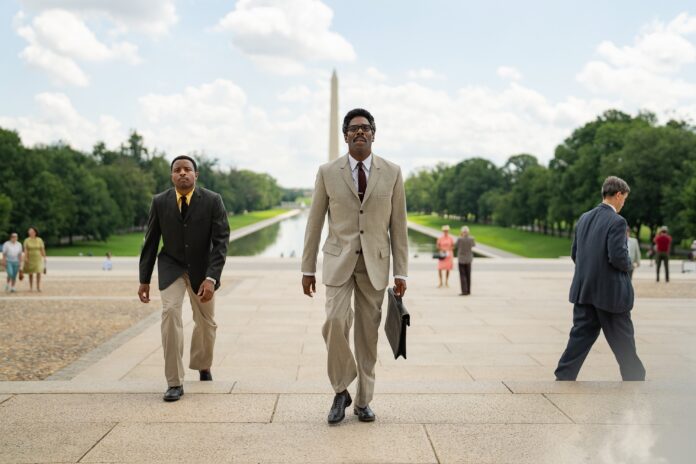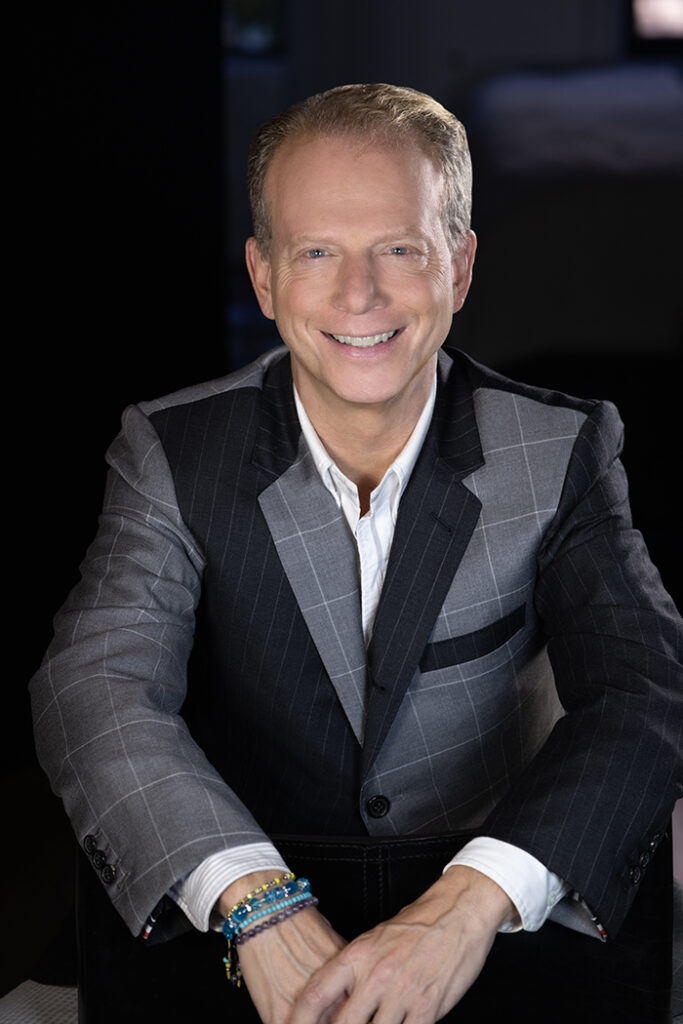
Available on Netflix Nov. 20, “Rustin” is a galvanizing biopic of Bayard Rustin, the gay man who organized the 1963 March on Washington. In an outstanding performance, out gay Philly native Colman Domingo portrays the activist as the force of nature he was, with his boisterous laugh, blustery speeches, quick wit and strong sense of self.
This emotional drama, directed by George C. Wolfe, shows Rustin’s fraught interactions with NAACP president Roy Wilkins (Chris Rock), as well as representative Adam Clayton Powell Jr. (Jeffrey Wright), who are afraid of his influence. It also depicts his friendship with Martin Luther King jr. (Aml Ameen), and his romantic relationships with Tom (Gus Halper) and Elias (Johnny Ramey), a married closeted man.
Producer Bruce Cohen spoke with PGN about this moving story of fighting for social and personal freedoms.
What did you know about Bayard Rustin that prompted you to make this film and why make this now?
I had actually known about Bayard from the documentary, “Brother Outsider.” I didn’t know the extent to which no one knows who he is today until I started working on the film. I had done “Milk,” with Dustin Lance Black, and we were working again on the miniseries, “When We Rise,” about LGBTQ activism in San Francisco. Dustin mentioned he was working on a script on Bayard Rustin. I told him to send me the script and let me produce it. He sent me the script he and Julian Breece wrote in 2017. As we tried to find a home for it, we realized no one had heard of Rustin and he was in danger of being lost to history completely. I remember thinking, I know one person who knows who he is — President Barack Obama, who gave Bayard Rustin the Presidential Medal of Freedom posthumously on the 50th anniversary of the March on Washington. He and Michelle had just opened Higher Ground, their production company at Netflix. We sent the script to Higher Ground and, fortunately, they loved it.
Did the Obamas give you notes?
They did give us notes. They were believers in letting the filmmakers make the film they wanted to make. They were not intrusive in any way. One of my favorite thoughts from President Obama was when he read an early draft of the script said, today when an audience sees this film, they know about the Women’s March, and the marches after George Floyd. Marches are a thing. But Bayard had invented the idea. There had never been a march for rights, certainly not 250,000 people. President Obama was saying, let’s make sure we understand the genius of Bayard Rustin to organize this incredible event on this scale that would change history forever. Rustin did it in eight weeks, without cell phones or the internet.
Can you talk about the approach to telling Rustin’s story? This is a biopic that focuses mainly on one short period of his life, which is great, because I hate the “soup to nuts” approach.
Those exact words could also have come out of George C. Wolfe’s mouth, who believes that as well. Lance and Julian had the concept of focusing on the months leading up to the March on Washington, with the addition of the period of the 1960s, which really set up the Martin Luther King and Bayard Rustin relationship and the arc that friendship goes on, which was all very true. We were all aligned not to tell the soup to nuts biopic.
As we were filming, both George and Colman Domingo felt the presence of Bayard Rustin with us, and we all had the distinct feeling that the more we got to know about him, the more we fell in love with how charismatic he is, how joyous he is, and how funny, and irreverent he is. We got the sense that if our movie was not funny, joyous, irreverent and entertaining, Rustin was going to come back and kick all our asses. Which is a funny, cute way of saying, we did not want to make a stodgy, boring, historic relic of a film.
Were there any concerns about how much gay content to include?
I love the simplicity of the image of Tom’s white hand touching Bayard’s Black shoulder. It’s a reveal that they are lovers, though you may have picked it up before. There is also the intercutting of Elias’s sermon about everyone is entitled to find love intercut with a gay sex scene. We shot more of both of those scenes. At no point were we told to “tone down the gay” in any way. As we put the film together, we noticed the propulsive, rapid energy. We agreed it was exactly the right amount to tell the story. This is not a movie about his personal relationship. They are a part of the story we’re telling. In Bayard’s case, the love of his life [Walter] came 10 years after the film ends. He and Walter were in committed relationship until Bayard passed away. The apartment you see in the film was Bayard’s apartment. Walter still lives there today, which is how we got it so accurate.

You have produced other queer-themed films, most notably “Milk,” “To Wong Foo…,” and “American Beauty,” for which you won an Oscar. Can you talk about telling queer history and queer stories?
Telling queer stories initially found me more than I found it. My sacred job as a producer is to tell great stories in all of their shapes and colors. When you read a script, a play, or an idea, you can’t get out of your head and become deeply passionate about getting it made, that becomes your new and exciting job — to get it on the screen or on the stage however you can. One of the incredibly beautiful and powerful things that has happened as my career has developed is that I have had the chance to be a part of and make some of these incredibly powerful stories.
One thing I realized making “Milk,” “When We Rise,” and “Rustin” — and this is something producers from all underrepresented communities experience — is that when we are trying to get our stories told, these stories will be lost to history if we don’t find ways to tell them. And if we do not tell these stories, they are not going to get told. But they need to be great stories, incredibly well told, and wildly entertaining or else you can almost do more damage than good.